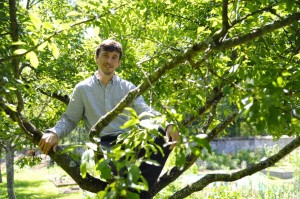- Rendez-vous de l'Institut
- Conference
Jardins, partage et consciences patrimoniales : les expériences croisées des jardins de Port-Royal au « Jardin citoyen européen » de la Maison-musée Jean Monnet by Sylvain HILAIRE – Château de Bénouville
Gardens, heritage sharing and heritage conscience: Cross experience in the Port-Royal gardens and the Jean-Monnet house and museum ‘European citizen’s garden’
This presentation is designed as an original summary of various research projects and experience in the field, conducted since the 2000s, between today’s and yesterday’s Port-Royal gardens, on the ‘other side of cultural landscape in the classical 17th century’ (theme covered during a previous conference in 2015), and the latest experiments conducted at the Jean Monnet house and museum, property of the European Parliament, towards the participative creation of the first ‘European citizen’s garden’.
All of these ventures stem from the same basic premise, that looks upon the garden as a complex heritage-related entity, an ancient anthropogenic area presenting a form of culture-nature hybridisation that is incessantly revisited and renewed, always with a capacity for hyperactive cultural, social and environmental intermediation. In simpler terms, the garden is one of the most operative areas offering access to History and collective memory, along with all the sociabilities and collective representations it embraces. As such, it constitutes a matricial societal area, a sort of ‘conscience incubator’, in particular with regard to heritage conscience, equally from a material, intangible, natural and cultural angle. A heritage substratum that proves to be particularly structural and active in the context of European culture.
Experience of the participative creation of these ‘heritage gardens’ from Port-Royal to Monnet’s house therefore seeks to explore and valorise all the garden’s unexpected potential, in order to share it with the largest audience, in particular from a socio-therapeutic viewpoint. These gardens are consequently designed as a ‘third culture-nature site’, as places for intermediation, encounter and convergence, where new relationships can be forged with the ‘genius of the site’, with one’s self and with the outside world, other modalities for exchange, inspiration and creation, other relationships with time and the living… Which all comes down to ‘cultivating our garden’ in all its dimensions.
Sylvain Hilaire
Sylvain Hilaire is a doctor in History, specialised in the study of gardens and cultural landscapes of the early modern period, in particular the Port-Royal des Champs heritage site. He is an associate researcher at the University of Sorbonne Paris Cité’s Pléiade laboratory, and at the University of Versailles St-Quentin / Paris Saclay’s CHCSC (Centre on the Cultural History of Contemporary Societies), where he also teaches culture-nature science mediation. Since 2017, he has acted as a member of the International Council on Monuments and Sites (ICOMOS – French section), where he has contributed towards the foundation of the work group entitled ‘Historic gardens and cultural landscapes’. He is a heritage conservation officer at the National Museum of Port-Royal des Champs, in charge of the CRDI – resource and interpretation centre, of which he designed and coordinated the implementation from 2008 to 2012. It was within this institution that he previously coordinated the creation of the ‘heritage gardens’ – experimental areas for mediation and heritage valorisation – that were awarded in 2006 with a Fondation de France prize as an innovative cultural project. Since, he has contributed towards the foundation and acted as chairman of the Paradeisos – European gardens association, which, in 2018, launched an experiment for the participative and pluridisciplinary creation of the first ‘European citizen’s garden’ at the Jean Monnet house and museum, which is the property of the European Parliament.


